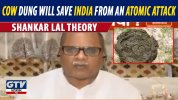
Stimson Poll: Vast Majority of Indians Believe Nuclear War Against Pakistan is Winnable
Vast majority of Indians, including those who oppose Prime Minister Narendra Modi, believe that nuclear war is "winnable", according to the ...
Vast majority of Indians, including those who oppose Prime Minister Narendra Modi, believe that nuclear war is "winnable", according to the results of a Stimson Center poll released recently. They want their country to build a bigger nuclear arsenal than China and Pakistan combined. Responding to the clamor for more nukes, Indian Prime Minister Narendra Modi said in 2019 that Indian nuclear weapons were not kept as mere showpieces. Strong belief about India's ability to win a nuclear war against Pakistan cuts across party lines with 91% of those who support Mr. Modi and 85% of those who don't. Recently, a group of researchers at Rutgers University considered a hypothetical nuclear conflict between India and Pakistan as they believed such a conflict was the most likely. The group warned that an India-Pakistan nuclear exchange will be catastrophic for the region with tens of millions of immediate fatalities in the war zone, followed by hundreds of millions of starvation deaths around the globe.
The poll also finds that the overwhelming majority of Indians are confident their military can defeat both China and Pakistan. They expect that the United States military would come to India's aid in the event of a war with China or Pakistan. Stimson Center analysts believe that "Indian self-confidence may lead to mistaken popular views of Indian military prowess: India has considerable military capabilities against its most likely regional opponents. Yet Indian confidence that India would likely defeat China or Pakistan may exceed what a careful net assessment might warrant".
The nuclear arsenals of India, Pakistan and China are small but growing faster than those of other nuclear-armed countries, according to a report in The Economist magazine. The combined nuclear stockpiles of China (350 warheads), India (160) and Pakistan (165) now exceed British and French arsenals in Europe (around 500 in total). All three countries are now building their own nuclear “triads”: nukes deliverable from land, air and sea.
The Stimson survey was conducted by phone with a random sample of 7000 Indians between April 13 and May 14, 2022. Below are its key findings as reported by Christopher Clary, Sameer Lalwani, Niloufer Siddiqui and Neelanjan Sircar:
1. High levels of support for Prime Minister Narendra Modi, who likely remains among the most popular national leaders in the world today;
2. Extraordinary nationalist sentiment among Indians, at high levels compared to prior cross-national surveys using identical question wording;
3. Troubling signs of intolerance toward India’s large Muslim minority, which helps provide context to recent controversies;
4. Strong confidence in the Indian government’s ability to defend India against potential domestic and foreign threats;
5. Expectations among a majority of Indian respondents that the U.S. military would support India in the event of a war with China or Pakistan; and
6. Large majorities in favor of Indian numerical nuclear superiority against its adversaries.
Related Links:
Haq's Musings
South Asia Investor Review
Muslims Worse Off Than Dalits in India
General Kidwai on Pakistan's 2nd Strike Capability
Dalit Death Shines Light on India's Caste Apartheid
Caste Discrimination Rampant Among Silicon Valley Indians
Rape: A Political Weapon in Modi's India
Hindutva: The Legacy of the British Rulers "Divide and Rule" Project
Will Modi's Hindutva Lead to Multiple Partitions of India?
Riaz Haq Youtube Channel
PakAlumni: Pakistani Social Network

Stimson Poll: Vast Majority of Indians Believe Nuclear War Against Pakistan is Winnable
Vast majority of Indians, including those who oppose Prime Minister Narendra Modi, believe that nuclear war is "winnable", according to the ...







 However, it is essential to note here that India has a functioning nuclear triad, and a mere targeting of its land-based launching facilities will not disable India’s second-strike capability.
However, it is essential to note here that India has a functioning nuclear triad, and a mere targeting of its land-based launching facilities will not disable India’s second-strike capability.






 :
:
